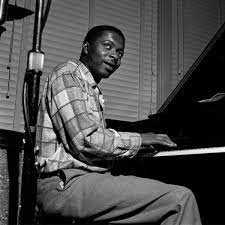Wynton Kelly: A Complete Biography
Introduction
Wynton Charles Kelly was a masterful jazz pianist whose vibrant, blues-infused playing style left a lasting imprint on modern jazz. Best known for his lyrical phrasing, rhythmic drive, and sensitive accompaniment, he became one of the most respected musicians of his era. Though his life was relatively short, his influence endures through the countless recordings he graced and the musicians he inspired.

Childhood
Wynton Kelly was born on December 2, 1931, in Brooklyn, New York, to Jamaican parents. Raised in a culturally rich environment, he was exposed to music from an early age. He began taking piano lessons at age four, displaying a natural talent for the instrument. Though he attended the High School of Music & Art in New York City, most of his musical development occurred outside the classroom. His learning was shaped by observation, immersion in his musical surroundings, and an eagerness to perform.
Youth
By the time he was a teenager, Kelly had begun performing professionally. At just 12 years old, he played in local R&B bands, and by his mid-teens, he was already making a name for himself on the New York jazz scene. His playing was marked by an innate sense of rhythm and a flair for improvisation, qualities that quickly set him apart from his peers. At the age of 19, he recorded his first album as a bandleader, showing an early maturity and clarity of musical vision.
During these years, Kelly worked with a range of rhythm and blues and jazz artists, gaining experience that would form the foundation of his distinctive sound. He developed a playing style that combined technical prowess with emotional depth, and his reputation as a versatile accompanist began to grow.
Adulthood
In the early 1950s, Kelly served briefly in the U.S. Army, but his career in music resumed soon after. He returned to the jazz circuit with renewed energy and quickly established himself as a prominent figure. He performed with a wide array of jazz luminaries, including Dinah Washington, Charles Mingus, Dizzy Gillespie, and Lester Young. These collaborations broadened his musical horizons and exposed him to a wide variety of styles and techniques.
Kelly’s most celebrated period began in 1958, when he joined the Miles Davis Sextet. Replacing Bill Evans, Kelly brought a more swinging, bluesy touch to the ensemble. His most notable contribution during this time was on the iconic album Kind of Blue, particularly on the track “Freddie Freeloader,” where his soulful, confident playing became an instant hallmark of the recording.
After parting ways with Miles Davis in 1963, Kelly formed his own trio, bringing in bassist Paul Chambers and drummer Jimmy Cobb. Together, they became one of the most respected rhythm sections in jazz, working both independently and with other major artists such as Wes Montgomery. Their tight interplay and natural chemistry allowed them to bring depth and swing to every performance.
Major Compositions and Recordings
While Wynton Kelly was more widely recognized for his performance than for original compositions, he nonetheless left behind a significant discography that showcases his unique voice on the piano. His early trio album Piano Interpretations revealed his refined touch and rhythmic agility. Later works, such as Kelly Blue and Kelly at Midnight, captured his ability to balance joyful swing with emotional complexity.
Kelly’s work as a sideman was equally important. He contributed to over a hundred albums, playing with artists such as John Coltrane, Cannonball Adderley, Sonny Rollins, and Abbey Lincoln. His role in these sessions was often that of the ideal accompanist—supportive, sensitive, and always swinging.
Among his most admired recordings is Smokin’ at the Half Note, made with guitarist Wes Montgomery. This album is frequently cited as a perfect example of small-group jazz, with Kelly’s trio providing a strong yet nuanced foundation for Montgomery’s melodic lines.
Death
Tragically, Wynton Kelly died young. On April 12, 1971, he passed away in Toronto, Canada, at the age of 39. He had long suffered from epilepsy and health complications, which contributed to his early death. His passing was a profound loss for the jazz community, as he was still very much in demand and artistically vibrant at the time.
Conclusion
Wynton Kelly’s legacy is one of elegance, swing, and musical integrity. Though his life was cut short, his influence as a pianist and accompanist continues to echo through the work of countless musicians. He brought a bluesy warmth and unshakeable rhythm to every performance, shaping the sound of modern jazz and elevating the role of the accompanist to new artistic heights. His recordings remain essential listening for anyone seeking to understand the emotional and rhythmic core of jazz.

Comments are closed